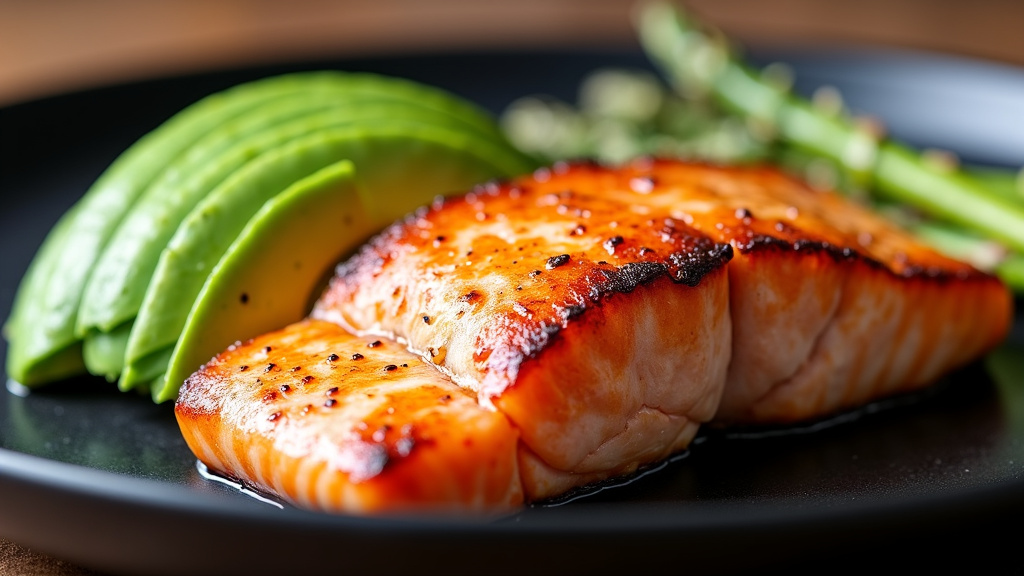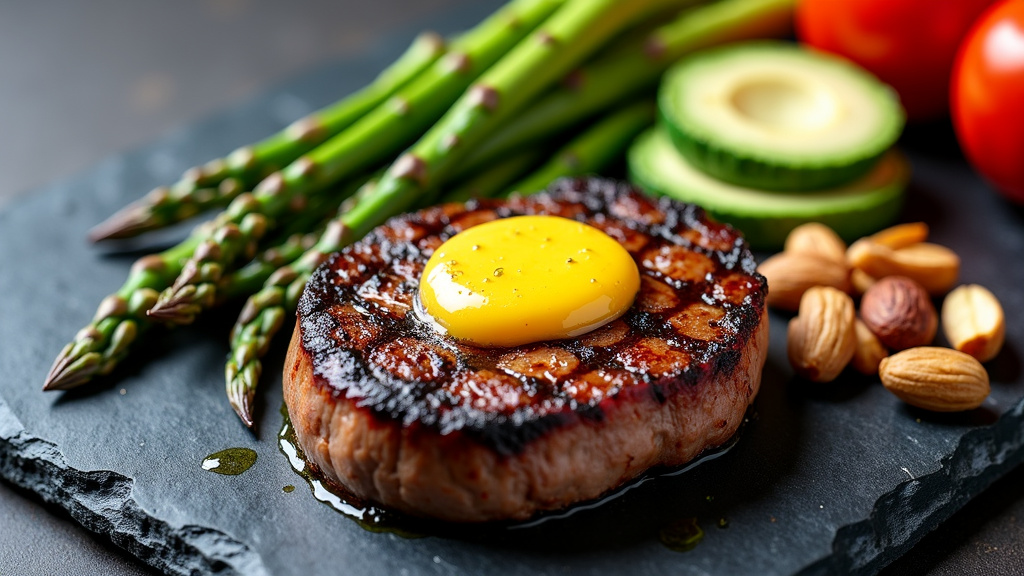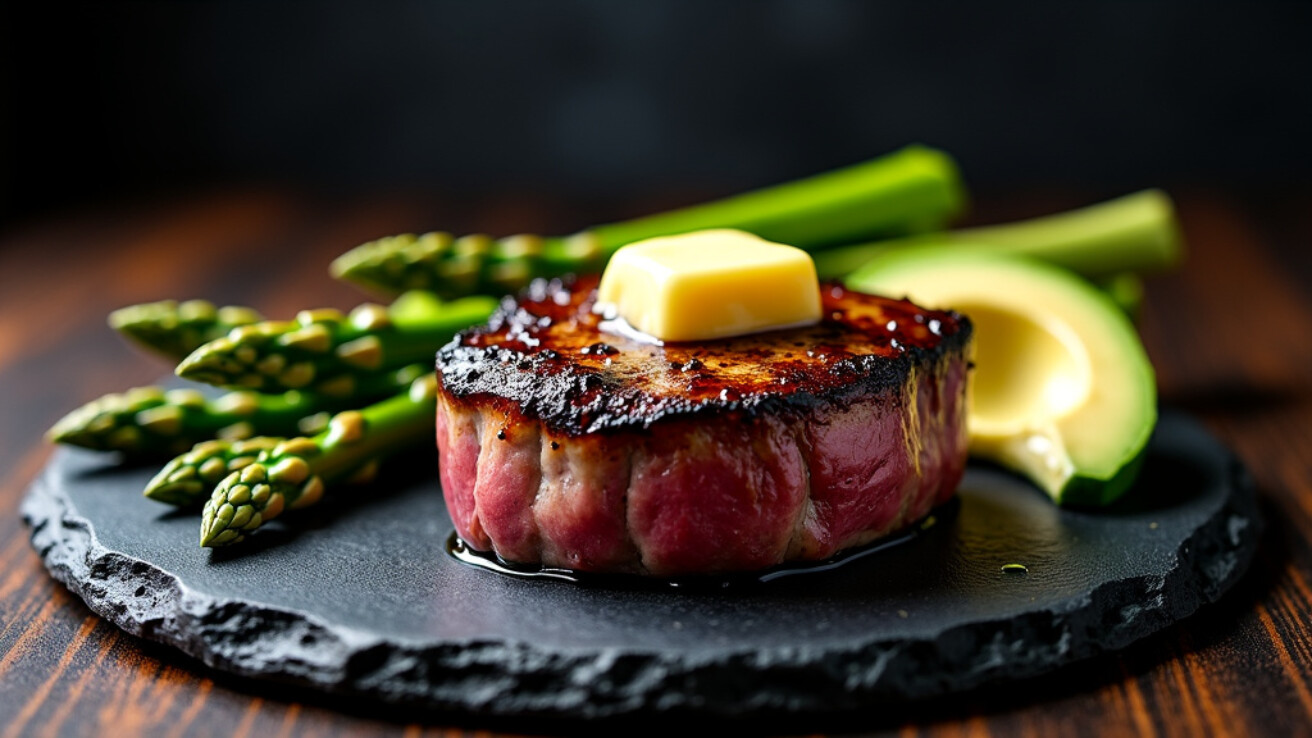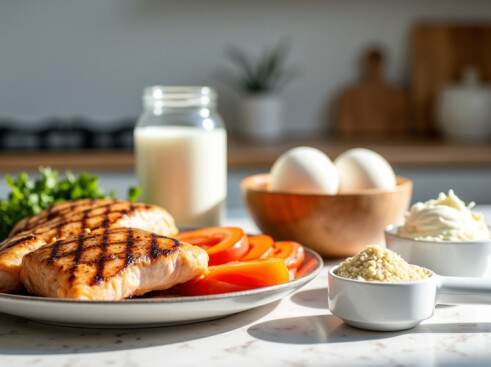Looking to transform your physique and optimize performance? Keto recipes offer a powerful approach to nutrition that’s reshaping how we fuel the male body. As a former skeptic turned advocate, I’ve witnessed firsthand how strategic low-carb eating can deliver remarkable results.
Studies focusing on resistance-trained men have shown that a well-crafted ketogenic diet can effectively build muscle and burn fat without compromising strength performance. This evidence challenges the traditional belief that carb-loading is the only path to peak physical condition.
The beauty of keto lies in its ability to adapt to various male fitness goals. Whether you’re aiming to shed stubborn belly fat, maintain lean muscle, or boost your energy levels, the right combination of high-fat, moderate-protein meals can support your objectives. In fact, research published in the Journal of Sports Sciences shows that strategic protein intake of 0.6-0.8 grams per pound of body weight is sufficient to optimize muscle protein synthesis – even on a ketogenic diet.
Imagine starting your day with sustained energy, powering through workouts without the mid-afternoon crash, and enjoying your meals while getting leaner. This approach represents a science-backed method of male nutrition that’s gaining recognition among athletes and fitness enthusiasts alike.
Ready to discover how ketogenic eating can enhance your health and performance? Let’s explore the essential recipes and strategies that make this approach both effective and sustainable. Your body will thank you for making the switch.
Note: This article contain affiliate links. If you purchase through these links, we may earn a commission at no extra cost to you.
Understanding the Keto Diet

The ketogenic diet has proven to be a powerful tool for men seeking to transform their bodies and optimize hormonal health. Recent research from a comprehensive 12-week study revealed that men following a keto diet not only preserved muscle mass but experienced significant improvements in testosterone levels.
Ketosis fundamentally changes your body’s fuel source – instead of relying on carbohydrates, your system learns to efficiently burn fat for energy. This metabolic state offers unique benefits for male physiology that many overlook.
I’ve witnessed numerous men transform their health through strategic implementation of keto principles. Success comes from understanding how to structure the diet for male-specific goals.
Testosterone and Muscle Benefits
Studies consistently show that ketogenic diets can maintain or boost testosterone levels in men. Healthy T-levels are essential for muscle growth, energy production, and overall vitality.
A study of 25 resistance-training men found that those following a ketogenic diet experienced a significant 118 ng/dL increase in total testosterone over just 11 weeks – enough to elevate someone from low T into the optimal range.
The diet’s high healthy fat content serves as a key factor, as dietary cholesterol provides essential raw materials for testosterone production. This evidence challenges the conventional belief that high carbohydrate intake is necessary for building and maintaining muscle.
Optimizing Fat Adaptation
For men focused on body composition, keto offers distinct advantages. When properly formulated, the diet typically includes 70-75% of calories from fat, 20-25% from protein, and just 5-10% from carbs.
The initial transition requires patience as your body adapts to using ketones for fuel. During this period, staying hydrated and maintaining adequate electrolytes becomes crucial – aim for at least 5 grams of sodium daily during the first few weeks.
A crucial point often overlooked: You can maintain strength training performance on keto. Research confirms that once fat-adapted, men can maintain and even gain muscle mass while keeping carbs extremely low.
| Diet Type | Carbohydrates (%) | Protein (%) | Fat (%) |
|---|---|---|---|
| Standard Keto Diet | 5-10 | 20-25 | 70-80 |
| High-Protein Keto Diet | 5-10 | 30-35 | 60-65 |
| Bariatric-Friendly Keto Diet | 5 | 30 | 65 |
Practical Implementation Tips
Focus on high-quality protein sources like fatty fish, grass-fed meats, and eggs. These provide both the protein needed for muscle maintenance and healthy fats to support hormone production.
Strategic meal timing around workouts can enhance performance. While the standard ketogenic diet maintains very low carb levels, some men benefit from a targeted approach incorporating 25-50 grams of carbs around training sessions.
Maintain adequate protein intake – aim for 1.4 to 2 grams per kilogram of body weight daily. Contrary to common belief, protein consumption won’t significantly impact ketone levels or kick you out of ketosis.
The ketogenic diet provides compelling benefits for men seeking to optimize their health and physique. When implemented with attention to male-specific needs, it effectively supports testosterone production, preserves muscle mass, and enhances fat-burning capabilities.
Essential Nutrients in Keto Recipes for Men
When crafting a ketogenic diet tailored for men’s health, understanding the precise balance of nutrients is crucial for both performance and overall wellbeing. LMNT, a leader in ketogenic nutrition, emphasizes the importance of maintaining proper electrolyte balance while pursuing ketosis.
The foundation of a successful keto diet rests on specific macronutrient ratios: 70-80% of calories from fat, 20-25% from protein, and just 5-10% from carbohydrates. This distribution helps men maintain muscle mass while promoting efficient fat burning.
I’ve found that many men initially struggle with this dramatic shift in eating patterns, but the benefits become evident with proper nutrient balance.
Protein Sources for Muscle Maintenance
Quality protein is essential for men following a ketogenic lifestyle. Grass-fed meats, fatty fish like salmon and mackerel, and whole eggs provide essential amino acids while supporting testosterone production.
When selecting protein sources, prioritize options that also deliver healthy fats. For instance, salmon offers both high-quality protein and omega-3 fatty acids, making it an ideal choice for keto-adapted men.
Maintaining adequate protein intake, typically 1.2-2.0 grams per kilogram of body weight, helps preserve lean muscle mass during ketosis. This is particularly important for active men and those engaged in resistance training.
Essential Fats for Hormone Health
Healthy fats form the cornerstone of a well-formulated ketogenic diet. Extra virgin olive oil, avocado oil, and coconut oil provide the energy substrate needed for sustained performance.
These fats play a crucial role in hormone production and regulation. Research shows that adequate fat intake supports healthy testosterone levels in men following a ketogenic diet.
I recommend incorporating a mix of saturated, monounsaturated, and omega-3 fats to support overall health. This diverse fat profile helps optimize hormone function while maintaining ketosis.
Critical Micronutrients and Electrolytes
The transition to ketosis requires careful attention to micronutrient intake. Men need to ensure adequate intake of magnesium, potassium, and sodium to avoid common side effects like fatigue and muscle cramps.
Iron requirements for men following a ketogenic diet typically hover around 8 mg daily. This can be met through careful selection of meat sources and leafy greens.
Supplementing with electrolytes often becomes necessary, especially during the initial adaptation phase. A science-backed electrolyte mix like LMNT can help maintain proper mineral balance while supporting optimal performance.
Protein-Packed Keto Breakfast Recipes for Active Men

Starting your day with a nutrient-dense, keto-friendly breakfast can make all the difference in your energy levels, workout performance, and mental clarity. As someone who’s experimented with countless morning meal combinations, I can tell you that getting the right balance of protein and healthy fats is crucial.
For men looking to maximize their morning nutrition while staying in ketosis, the key is focusing on protein-rich ingredients that fuel muscle recovery and support sustained energy. Here are effective breakfast options to enhance your morning routine.
Power-Packed Egg-Based Breakfasts
The classic cheesy fried eggs with a crispy cheese base offer an impressive 20+ grams of protein per serving. This combination creates an ideal keto-friendly foundation for lasting morning energy.
For those seeking variety, try Irish scrambled eggs enhanced with cream and butter, paired with smoked salmon for an omega-3 boost. This satisfying combination delivers both protein and healthy fats essential for cognitive function.
Transform your basic eggs into a gourmet experience with a Mediterranean-style breakfast bowl. Combine hard-boiled eggs with crumbled feta, olive oil, and fresh vegetables for a refreshing twist on traditional egg dishes.
Quick Prep Solutions for Busy Mornings
Meal prep champions will appreciate the keto breakfast casserole option. Load it with spinach, feta cheese, and your choice of protein for a week’s worth of grab-and-go breakfasts that maintain their flavor and texture.
Looking for something even quicker? A protein-rich smoothie combining avocado, spinach, and coconut milk provides essential nutrients without disrupting your morning routine. This blend offers the perfect balance of healthy fats and protein.
For a no-cook option, assemble a cold breakfast plate featuring high-quality proteins like salami, hard-boiled eggs, and cheese. This versatile option allows for endless combinations while keeping your macros in check.
Innovative Keto-Friendly Alternatives
Missing traditional breakfast foods? Try keto-approved fluffy pancakes made with almond flour. These delicious alternatives contain only 5 net carbs per serving while delivering an impressive protein punch.
For a unique twist, consider keto cauliflower hash browns that perfectly complement any protein source. They provide the satisfying crunch you crave while maintaining your ketosis goals.
Muscle-Building Keto Lunch Ideas
Creating a muscle-building keto lunch requires strategic planning and the right combination of nutrients. Transform your midday meal into a powerhouse of clean protein and healthy fats that will fuel muscle growth while maintaining ketosis.
Focus on incorporating premium protein sources like grass-fed beef, free-range chicken, and wild-caught fish. These proteins provide essential amino acids that support muscle recovery and growth while aligning with your ketogenic lifestyle.
LMNT enhances these muscle-building lunches by providing essential electrolytes, which are particularly important on a ketogenic diet. Their science-backed formulation helps maintain proper hydration and mineral balance during workout sessions.
Essential Components of Muscle-Building Keto Lunches
Start with a foundation of 6-8 ounces of protein-rich foods like grilled chicken breast, grass-fed beef, or fatty fish. These proteins serve as building blocks for muscle recovery and growth.
Include healthy fats from sources like avocados, olive oil, and MCT oil to maintain ketosis and provide sustained energy. These fats optimize hormone production, essential for muscle development.
Incorporate low-carb vegetables like spinach, broccoli, and cauliflower for necessary micronutrients. These vegetables deliver fiber and vitamins while keeping net carbs minimal.
Quick and Practical Meal Ideas
Create a power-packed bowl combining grilled chicken thighs with cauliflower rice, topped with avocado and olive oil. This combination delivers sustained energy for afternoon workouts.
Assemble a muscle-building salad with wild-caught tuna, mixed greens, hard-boiled eggs, and a high-fat dressing. This option requires minimal prep time while maximizing nutrition.
Prepare lettuce wraps filled with grass-fed ground beef, shredded cheese, and sliced bell peppers. These portable wraps offer convenient nutrition for busy days.
Meal Prep Strategies for Success
Dedicate Sunday evenings to preparing protein portions for the week. Grill chicken breasts, cook ground beef, or bake salmon fillets in bulk to streamline weekday meal preparation.
Store prepared proteins in individual portions using airtight containers. This organization allows for quick and efficient lunch assembly each morning.
Pre-cut vegetables and store them in water-filled containers to maintain freshness. This preparation ensures ready-to-eat vegetables are always available for quick meal assembly.
Keto Dinner Recipes for Recovery and Satiety

After an intense workout, your muscles need proper nutrition to repair and rebuild. Carefully crafted keto dinner recipes provide the perfect balance of protein and healthy fats while keeping carbs low, supporting optimal recovery.
According to research from the International Society of Sports Nutrition, consuming 20-40 grams of protein within two hours after exercise is crucial for optimal muscle recovery and growth. This makes protein-rich keto meals an excellent choice for post-workout nutrition.
Protein-Packed Recovery Recipes
The keto chicken parmesan delivers an impressive 38 grams of protein per serving while keeping carbs under 4 grams. Tender chicken and melted cheese provide lasting satisfaction.
For seafood lovers, pan-seared salmon with avocado offers an excellent recovery option. Omega-3 fatty acids support muscle repair, while healthy fats from avocado enhance satiety and nutrient absorption.
A classic keto bacon cheeseburger casserole transforms comfort food into a recovery powerhouse. Using cauliflower instead of traditional starches delivers satisfaction without compromising ketosis.
Comfort Food Alternatives
Craving Italian? Zucchini noodle-based chicken alfredo provides creamy comfort while supporting recovery goals. The protein and healthy fats combination helps prevent late-night cravings.
Another crowd favorite is keto shepherd’s pie, featuring cauliflower mash instead of potato topping. This hearty dish delivers sustained energy and promotes muscle recovery through its protein-rich beef base.
For a quick weeknight option, try the cheesy taco skillet. Lettuce wraps replace traditional shells, maintaining Mexican flavors while supporting your fitness goals.
Remember to monitor portion sizes with keto-friendly meals. While these recipes are designed for satiety, overconsumption can affect your results. Aim for portions that satisfy without overfilling.
Keto Snacks and Pre-Workout Fuel for Men
The key to effective keto pre-workout nutrition combines optimal timing with proper macronutrient balance. Research indicates that consuming fat-rich snacks 30-60 minutes before exercise provides sustained energy while maintaining ketosis.
Here’s how to optimize your pre-workout nutrition while adhering to ketogenic principles.
Essential Pre-Workout Keto Snacks
Fat bombs and protein-rich options deliver excellent pre-workout energy. An ideal keto snack provides lasting fuel without causing digestive issues during training.
Greek yogurt paired with a handful of nuts creates an optimal balance of protein and healthy fats. This combination delivers approximately 15g of protein and essential fats to power your workout.
Timing Your Pre-Workout Fuel
The optimal window for consuming keto pre-workout snacks is 30-45 minutes before training. This timing ensures proper digestion and energy availability during your session.
For morning training sessions, choose lighter options like MCT oil or a protein-rich smoothie. These deliver quick energy while remaining gentle on your stomach during exercise.
Afternoon or evening sessions accommodate heartier pre-workout fuel options, as your digestive system performs more efficiently later in the day.
Performance-Boosting Combinations
Strategic combinations of keto-friendly foods enhance pre-workout nutrition. For example, pairing avocado with eggs delivers both immediate and sustained energy release.
Athletes following a ketogenic diet benefit from electrolyte supplementation before training. LMNT’s electrolyte drink mix provides essential minerals without adding carbs.
Remember to stay hydrated and maintain electrolyte balance, especially during intense training sessions. This supports optimal performance and prevents fatigue.
Optimizing Keto Recipes for Male Health and Fitness

Throughout this guide, we’ve explored effective ways to adapt ketogenic nutrition for male-specific health and performance goals. Research demonstrates that while a standard keto approach provides a solid foundation, strategic modifications enhance outcomes for muscle growth, strength, and athletic performance.
Optimizing recipes and meal timing requires consistent protein intake. Studies from the International Journal of Sports Nutrition demonstrate that consuming 1.6-2.0 grams of protein per kilogram of body weight supports muscle preservation and growth during ketosis. .
For athletes and active men, strategic nutrient timing around workouts delivers significant benefits. The targeted ketogenic approach, allowing 25-50g of carbs pre- or post-training, fuels high-intensity performance while maintaining ketosis benefits. This precise customization ensures optimal nutrient delivery when your body needs it most.
As you refine your ketogenic approach, remember that individual responses vary. What works optimally for one man’s goals and physiology may require adjustment for another. Success comes from combining evidence-based principles with attentive monitoring of your body’s signals and performance metrics. Through consistent implementation, you can develop a sustainable keto lifestyle that aligns with your health and fitness objectives.
Stay hydrated with LMNT – the ultimate science-backed electrolyte drink mix. Get a free sample pack with your purchase – claim yours now!







